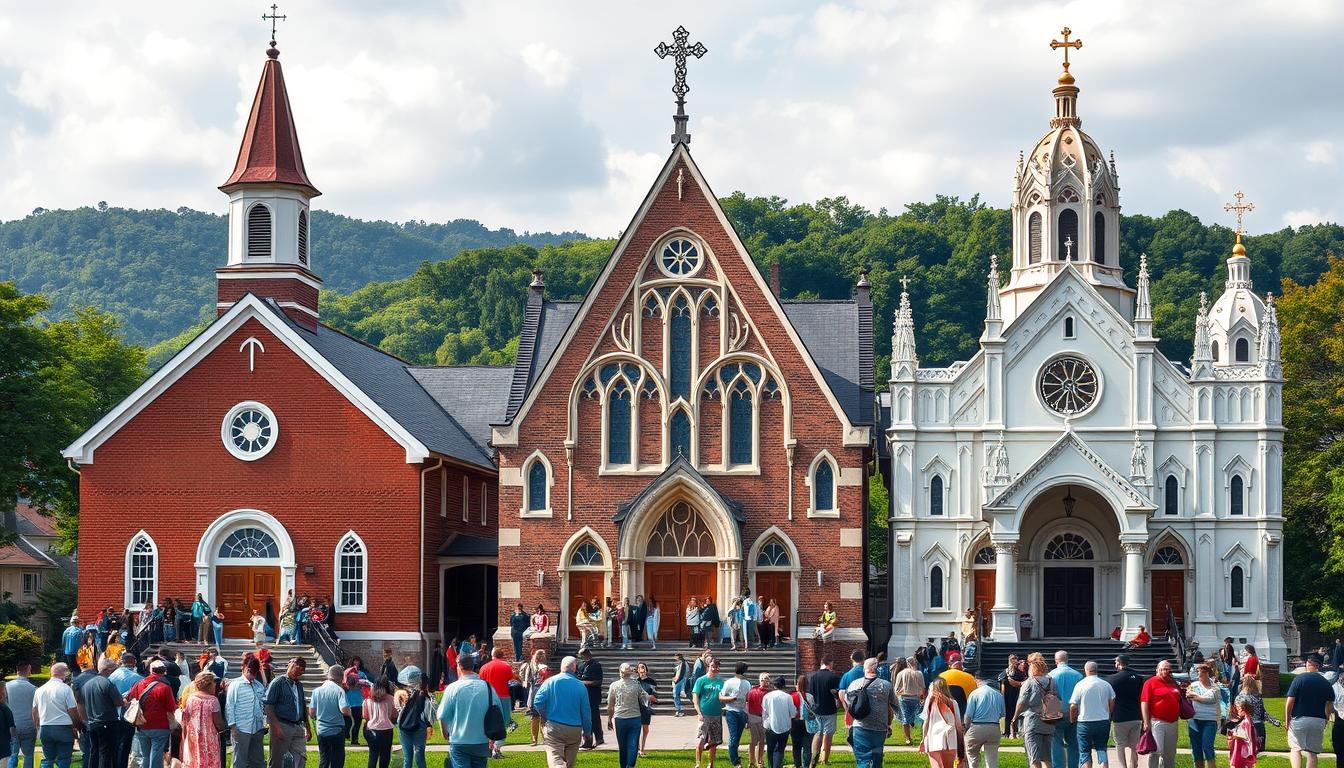What makes Methodist, Lutheran, and Catholic traditions unique? Looking into their theological, structural, and practical differences helps us understand Christianity’s diversity. These faiths have their own views on Scripture, tradition, and sacraments. Each reflects a different way of seeing the Christian faith.
Exploring these differences reveals the richness and complexity of Christianity. It shows how diverse and deep the Christian experience can be.
Key Takeaways
- The Methodist, Lutheran, and Catholic denominations have distinct theological foundations and practical applications of their beliefs.
- Differences exist in areas such as the authority of Scripture, the doctrine of justification, and the understanding of the sacraments.
- Organizational structures, clergy roles, and worship practices also vary among these Christian traditions.
- Exploring these distinctions can foster a deeper appreciation for the diversity within Christianity and the unique perspectives of each denomination.
- Understanding the key differences can help readers navigate the complex landscape of Christian beliefs and practices.
Introduction to Christian Denominations
Christianity is a diverse religion with many denominations and sects. These traditions come from the Protestant Reformation and the theological differences between Catholicism and Protestantism. Major Protestant groups like Lutheran, Methodist, and Baptist have different beliefs. These include their faith’s basis, the role of Scripture, and salvation.
Historical Roots and Theological Foundations
The Protestant Reformation in the 16th century changed the Christian landscape. It challenged the Roman Catholic Church’s authority. This led to many Protestant traditions, each with its own views on Scripture and salvation.
Overview of Major Protestant Denominations
The seven major Christian denominations are Anglican/Episcopal, Assembly of God, Baptist, Lutheran, Methodist, Presbyterian, and Roman Catholic. They differ in their beliefs, with some focusing only on the Bible. Others, like Roman Catholic, also consider church fathers and popes. Yet, they all agree on core beliefs outlined in creeds like the Apostles’ Creed.
Christian denominations have different views on Scripture. Baptists and Methodists believe it’s inspired and inerrant. Others have a more complex view. Despite these differences, they all believe in the Trinity and Jesus’ divinity.
The Protestant Reformation created a rich variety of Christian beliefs and practices. The Catholic Church, one of the largest, believes in a larger biblical canon than Protestants. The Southern Baptist Convention, a major Baptist group in the U.S., is known for its conservative views and focus on faith in Jesus Christ.
Despite their differences, these denominations aim to spread the Christian message. They do this through community outreach, missions, and education.
Methodist Beliefs and Practices
The Methodist tradition was started by John Wesley. It focuses on personal holiness and helping others. Methodists use the Wesleyan Quadrilateral to understand their faith. This method combines scripture, tradition, reason, and experience.
This way, Methodists can see the Bible in different ways. They don’t just look at it alone, like some other Protestants do.
Wesleyan Quadrilateral and Personal Holiness
At the heart of Methodist beliefs is personal holiness. They believe in working with God’s grace to keep getting better. They value feelings, love, and excitement in their faith, not just thinking and rules.
Methodists also think it’s possible to lose their way, unlike some Lutherans who believe everyone will stay on the right path.
Methodist Church Structure and Governance
The Methodist church has a connectional structure and way of making decisions. It has regional conferences and a general conference at the top. This system helps everyone agree on important beliefs, since each local church can’t go it alone.
Methodist worship includes special events like the “love feast.” It’s about faith together, along with Baptism and Holy Communion.
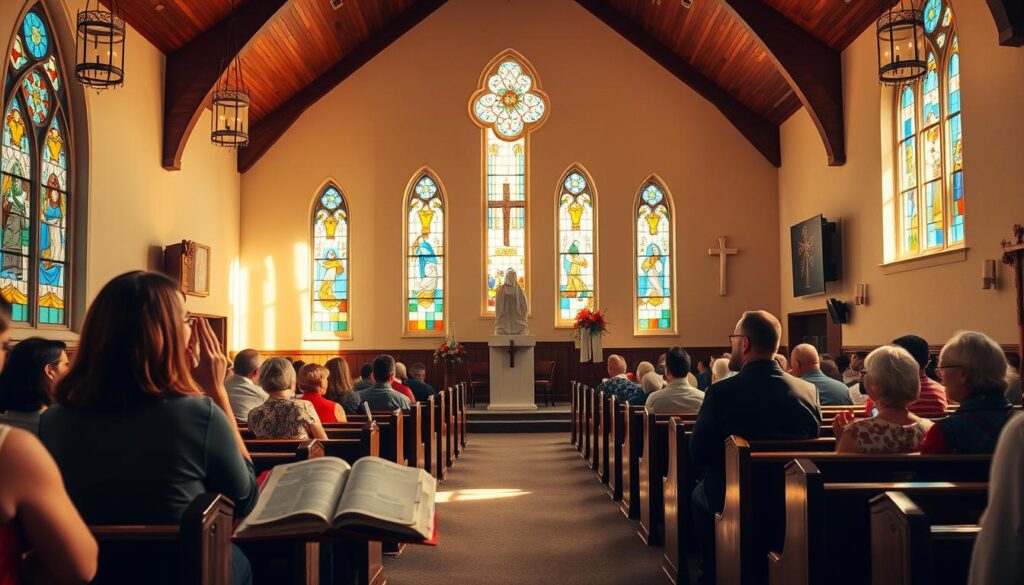
Methodists and Lutherans share some beliefs, like the importance of sacraments. But Methodists focus more on getting better and using the Wesleyan Quadrilateral. They also have more flexible worship.
This shows how diverse and rich Christian beliefs and practices can be.
Lutheran Doctrine and Traditions
At the heart of Lutheran theology is the idea of justification by faith. This idea comes from Martin Luther. Lutherans believe the Bible is the only source of Christian teachings. They reject the need for other sources like tradition or reason.
The Augsburg Confession is key to Lutheran beliefs. It was written by Luther and his friends. It shows how faith is central to being saved, not our own actions.
Justification by Faith and the Augsburg Confession
Lutherans see humans as passive in their journey to faith. They believe only God’s grace can save us. The Augsburg Confession says this grace comes through the gospel and sacraments, not from us.
United Methodists focus on social justice, but Lutherans see the church’s main job as sharing the gospel. Lutherans believe it’s up to each person to help society, not just the church. They don’t believe in the “social gospel” and focus more on eternal salvation.
Lutheranism has many sub-denominations, each with its own views. The Evangelical Lutheran Church in America (ELCA) is big in the US and leans more liberal. The Wisconsin Evangelical Lutheran Synod (WELS) and the Lutheran Church-Missouri Synod (LCMS) are more conservative.
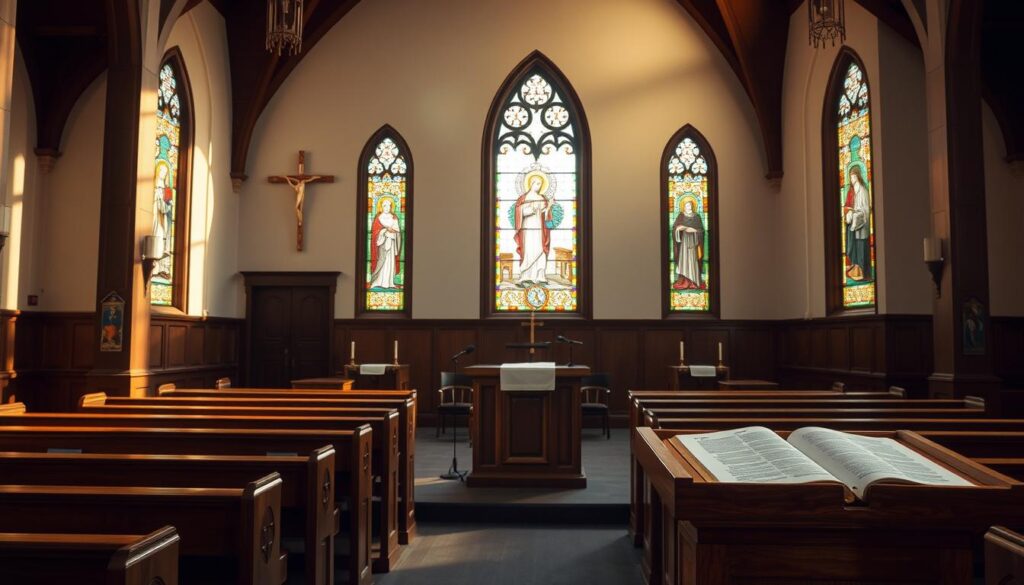
“The central message of the Reformation was the doctrine of justification by faith alone in Christ alone – not by any works or merits of our own.”
– R.C. Sproul, theologian
These differences show the wide range of views in Lutheranism. They also reflect the diversity in Christian denominations. Knowing these differences helps us understand the complex world of Christian beliefs.
Catholic Teachings and Sacraments
The Catholic Church has a special view on Scripture and Tradition. They believe both are equally important in shaping Catholic beliefs. This is different from Lutherans, who focus only on the Bible.
Authority of Scripture and Tradition
Catholic teachings say truth comes from both Scripture and Tradition. Tradition, seen in the Church’s history and liturgy, helps understand Scripture.
Doctrine of Justification and Salvation
The Catholic Church sees salvation differently than Lutherans. They believe salvation comes from both faith and good works. Catholics see salvation as a journey of growth, where God’s grace changes us.
The sacraments are key in this journey. The Church has seven sacraments, like Baptism and Eucharist, which give grace and help us grow spiritually. This view is different from some Protestants, who focus more on individual faith.
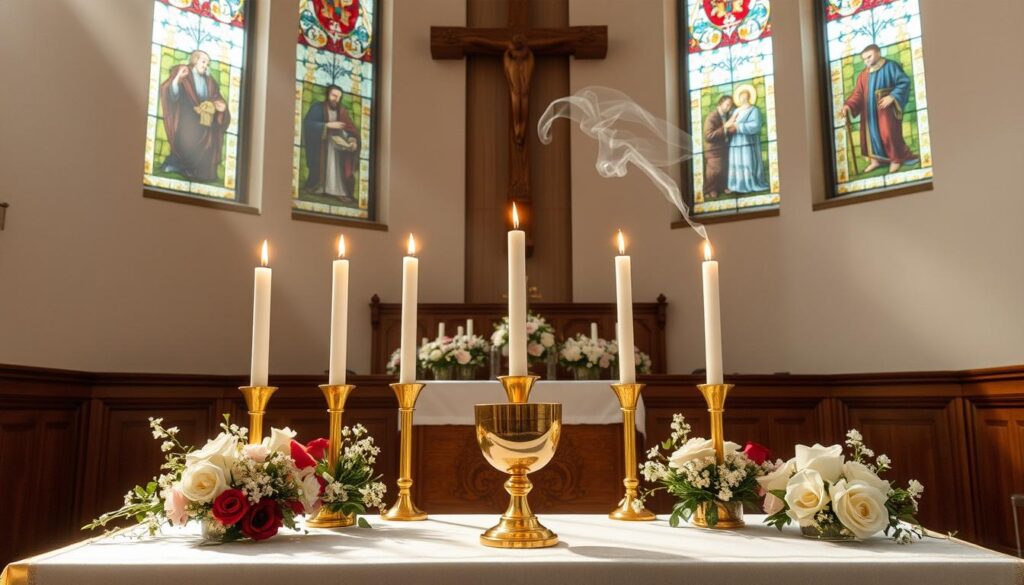
Catholicism has a special way for adults to join the faith. Unbaptized adults become catechumens and go through a process of initiation. Baptized adults from other faiths prepare to receive Confirmation and Eucharist.
In summary, the Catholic Church’s views on Scripture, Tradition, and sacraments make it unique among Christian denominations.
Methodist vs Lutheran vs Catholic: Key Differences
The Methodist, Lutheran, and Catholic denominations share some common beliefs but also have their own unique teachings. The Protestant Reformation in the 16th century was sparked by Martin Luther’s disagreement with the Catholic Church’s sale of indulgences. This led to the Five Solae: faith alone, grace alone, Christ alone, scripture alone, and glory to God alone.
The Lutheran church has about 80 million followers worldwide, while Methodism has around 77 million. Both recognize 66 books of the Bible and have two main sacraments: Baptism and Holy Communion. Yet, they differ on scripture, justification, and sacraments.
Lutheranism is a key branch of Protestantism, along with Anglicanism, Calvinism, Methodism, and Baptism. Lutheran missionaries spread Lutheranism globally, establishing churches in many countries. In the US, the Evangelical Lutheran Church in America (ELCA), the Lutheran Church–Missouri Synod (LCMS), and the Wisconsin Evangelical Lutheran Synod (WELS) are among the largest Lutheran denominations.
| Denomination | Membership | Sacraments | Biblical Canon | Key Theological Distinctions |
|---|---|---|---|---|
| Methodist | 77,000,000 | Baptism, Holy Communion | 66 books | Sola scriptura, views on sex and divorce, just war theory |
| Lutheran | 80,000,000 | Baptism, Holy Communion | 66 books | Sola scriptura, views on sex and divorce, just war theory |
| Catholic | 1.3 billion | 7 sacraments | 73 books | Authority of scripture and tradition, doctrine of justification, role of the papacy |
Methodists and Lutherans share some beliefs but also have big differences. The Catholic Church has its own views, focusing on scripture and tradition, transubstantiation, and the papacy.
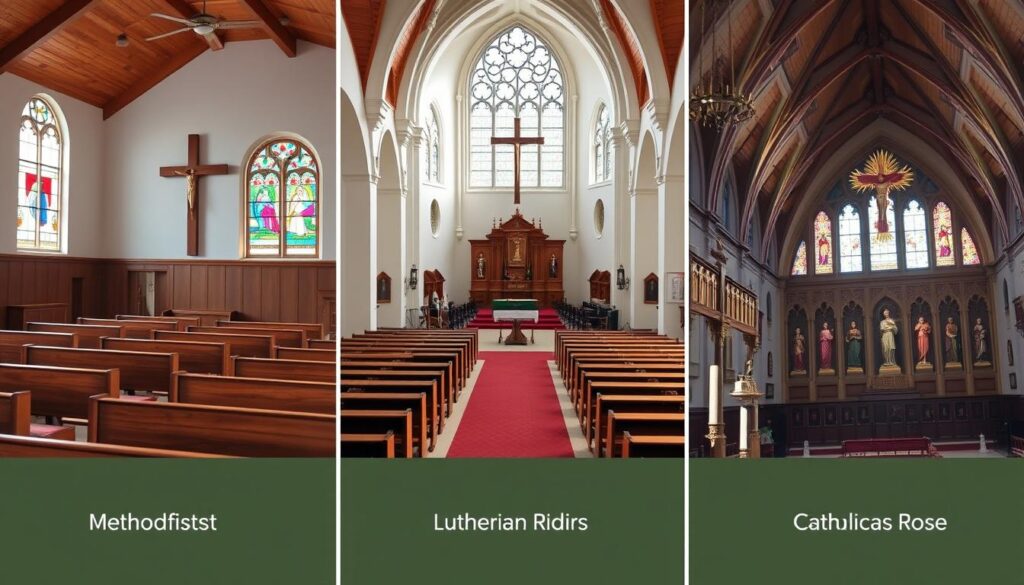
These differences have shaped the unique identities and practices of Methodist, Lutheran, and Catholic denominations.
The Role of Mary and the Saints
The role of the Virgin Mary and the saints has sparked debate among Methodists, Lutherans, and Catholics. Catholics have long prayed to the saints, including Mary. Lutherans, however, do not believe in this practice. The Catholic Church sees Mary as a bridge between God and people, a view Lutherans do not share.
Protestant Reformers like Martin Luther had mixed views on honoring Mary. Luther wanted to honor Mary but warned against too much reverence. John Wycliffe, before Luther, believed in seeking Mary’s help for eternal reward. Lutherans still believe in Mary’s virginity and her role as the Mother of God.
The early Church didn’t show much devotion to Mary, but by the fifth century, they called her the Mother of God. In the Middle Ages, Mary’s role grew, with prayers and hymns in her honor. Lutherans, however, stopped praying to Mary, focusing on the Triune God.
In the Catholic tradition, honoring the saints, including Mary, is a long-standing practice. Lutherans and Methodists, however, don’t believe in praying to saints, focusing on worshiping God alone.
| Tradition | Perspective on Mary and the Saints |
|---|---|
| Catholic | Believe in the veneration of the saints, including the Blessed Virgin Mary, and see Mary as a mediator between God and humanity. |
| Lutheran | Do not believe in praying to the saints or view Mary as a mediator, but maintain a belief in her perpetual virginity and role as the Mother of God. |
| Methodist | Like Lutherans, Methodists do not believe in the practice of praying to the saints or venerating Mary as a mediator. |
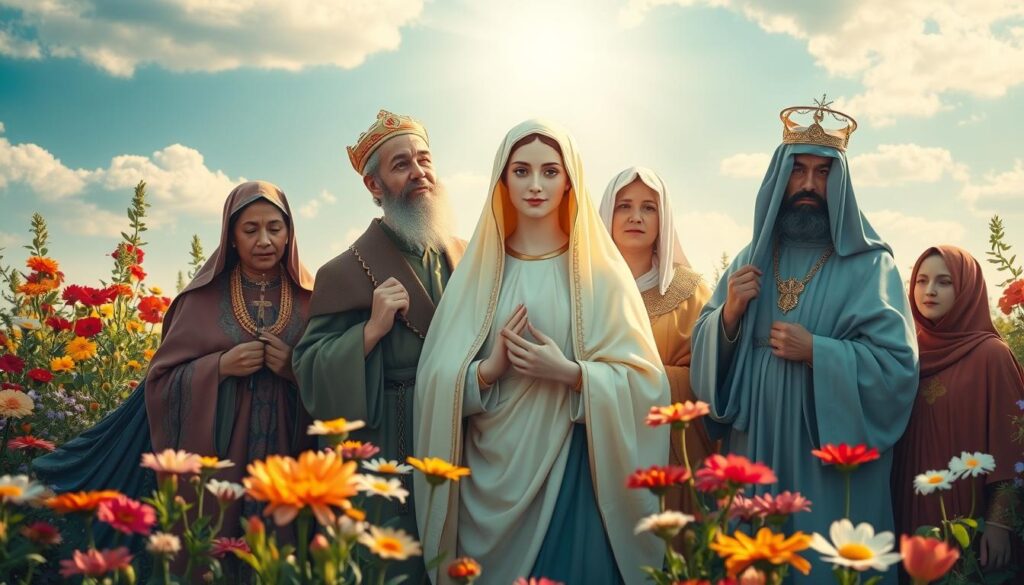
The different views on Mary and the saints show the theological and historical gaps between Catholics, Lutherans, and Methodists. Catholics deeply honor the Mother of God and the saints. Protestants, however, believe that worship should only be for God.
Clergy and Church Hierarchy
The Methodist, Lutheran, and Catholic churches have different leadership structures. The Catholic church has a strict hierarchy, with the Pope at the top. On the other hand, Methodist churches have elected bishops for regional conferences. Baptist churches are more independent, with each congregation making its own decisions.
The Catholic church has a clear clergy hierarchy, including deacons, priests, bishops, archbishops, and the Pope. In the Methodist tradition, there are local preachers, deacons, elders, and bishops. The Lutheran Church-Missouri Synod (LCMS) only allows communion to its members or those from affiliated churches, with some exceptions.
The power and decision-making abilities of clergy also differ. The Catholic church has a strong central authority, with the Pope and the Vatican having a lot of influence. In contrast, Methodist and Baptist churches give more power to local congregations, making decisions more locally.
| Denomination | Clergy Structure | Decision-Making Authority |
|---|---|---|
| Catholic | Deacons, Priests, Bishops, Archbishops, Pope | Highly centralized, with the Pope and Vatican exercising significant authority |
| Methodist | Local Preachers, Deacons, Elders, Bishops | More decentralized, with greater autonomy at the local congregation level |
| Lutheran (LCMS) | Practices “close communion,” with limited exceptions | Decentralized, with the LCMS maintaining theological differences with the ELCA |
These differences show how unique the Catholic, Methodist, and Lutheran denominations are. They reflect their different beliefs and ways of organizing.
Worship Practices and Liturgy
The Methodist, Lutheran, and Catholic denominations have unique worship practices and liturgical traditions. These reflect their theological views and historical backgrounds. Though they share common Christian roots, their views on sacraments, liturgical forms, and clergy roles differ greatly.
Sacraments and Liturgical Traditions
Lutherans emphasize Baptism and Holy Communion as key sacraments. They believe in traditional liturgical forms, keeping with historical Christian practices. Lutherans adapt worship to fit local needs, sometimes facing challenges, as seen in Magdeburg during the Enlightenment. They also offer a chance to confess sins, a practice less common in other denominations.
Methodists, influenced by John Wesley, focus on personal holiness. They use the “Wesleyan Quadrilateral” of scripture, tradition, reason, and experience to guide worship. Methodist services are more flexible and less structured than those of Lutherans and Catholics.
The Catholic Church values its long-standing liturgical tradition and sacraments, especially the Eucharist. Catholic worship is formal, with the priest at its center. It includes symbolic elements like stained-glass windows, altars, and processional rites.
Despite their differences, all three denominations respect their liturgical traditions. They have varying degrees of emphasis and adaptation. Ongoing dialogue and ecumenical efforts aim to increase understanding and unity among Christians.
Biblical Interpretation and Authority
The way people interpret the Bible and see its authority is a big difference between Methodist, Lutheran, and Catholic traditions. Methodists believe the Bible is the final authority, following John Wesley’s teachings. They broke away from Calvinism and focused on themes like justification and the “latter day glory.”
Lutherans, on the other hand, believe in sola Scriptura, or the Bible alone as the ultimate authority. They reject the Pope’s authority and believe in salvation by faith alone.
The Catholic Church believes in the authority of both the Bible and Tradition. This view is different from the Protestant focus on sola Scriptura. This difference leads to debates between Catholics and Protestants about the Bible’s role and interpretation.
| Denomination | Approach to Biblical Interpretation | View on Authority of Scripture |
|---|---|---|
| Methodist | Wesleyan Quadrilateral: Scripture, Tradition, Reason, Experience | Final authority of Scripture |
| Lutheran | Sola Scriptura (Scripture alone) | Scripture as the ultimate source of authority |
| Catholic | Balance between Scripture and Tradition | Authority of both Scripture and Tradition |
“We believe the Bible to be the inspired, the only infallible, authoritative Word of God.” – Methodist Article of Religion
The different views on the Bible and its authority show the main differences between Methodist, Lutheran, and Catholic traditions. These views shape the ongoing talks between Catholic vs Protestant denominations. They influence how each group understands the Biblical interpretation and the authority of Scripture.
Social and Ethical Issues
The Methodist, Lutheran, and Catholic denominations have different views on today’s social and ethical debates. They discuss the church’s role in social justice, LGBTQ+ rights, and the value of life.
Perspectives on Contemporary Debates
Methodists believe in moral growth and achieving Christian perfection in life. They focus on overcoming sins of the heart, which guides their views on social and ethical issues.
Lutherans, influenced by Martin Luther, emphasize the Holy Spirit and faith leading to good works. This shapes their approach to making ethical choices and taking social responsibility.
The Catholic Church values Scripture and tradition, leading to a unique stance on social and ethical debates. Their doctrine on justification and salvation, along with the church’s hierarchy, influence their views.
These different theological views and interpretations of scripture cause big differences in how Methodists, Lutherans, and Catholics tackle today’s social and ethical challenges.
“The duty of a Christian in Calvinism is to glorify God in their calling by fulfilling daily tasks in a rational organizational manner.”
Ecumenical Efforts and Dialogues
The ecumenical movement aims to unite Christians. It has been a key focus for the Catholic Church in recent years. The Church wants to end divisions by showing unity, which it believes exists within itself.
The Second Vatican Council highlighted the importance of unity. Since then, the Church has worked hard to unite with other Christian groups.
The ecumenical movement started with missionary and youth groups in the 19th century. These groups brought Christians together from different backgrounds. The World Mission Conference in Edinburgh (1911) was a key event that led to today’s ecumenical efforts.
Today, ecumenism includes many activities and theological discussions. While leaders have often been from Europe or North America, grassroots efforts have increased diversity.
Agreements have been made on baptism, ministry, and the Eucharist with Anglicans and Lutherans. But issues like the ordination of women and acceptance of gay relationships have posed challenges. Despite these, the Catholic Church remains dedicated to unity, seeing it as Christ’s will.
The Lutheran Church-Missouri Synod has surprisingly agreed to the “Declaration on the Way: Church, Ministry and Eucharist.” This document shows that Lutherans and Catholics share beliefs about Christ’s presence in the Eucharist.
The ecumenical movement is crucial for the Catholic Church’s goal of Christian unity. Through ecumenical efforts and dialogues, the Church has made significant progress. Yet, it faces ongoing challenges in a changing world.
Denominational Diversity and Subgroups
The Christian faith is a rich tapestry of denominational diversity. It includes various subgroups and variations within Methodist, Lutheran, and Catholic traditions. These differences show the dynamic nature of religious expression and the ongoing exploration of theological perspectives within the Christian community.
Exploring Variations Within Traditions
While Methodist, Lutheran, and Catholic denominations share common Christian beliefs, each has its own practices, governance, and interpretations of scripture and doctrine. These variations contribute to the denominational diversity that exists within the broader Christian landscape.
The Methodist Church focuses on the Wesleyan Quadrilateral, balancing scripture, tradition, reason, and personal experience in theological decision-making. The Lutheran tradition emphasizes “justification by faith,” as stated in the Augsburg Confession. The Catholic Church values the authority of Scripture and Tradition, along with the doctrine of justification and salvation.
These differences have led to various subgroups and denominations within each tradition. Examples include the African Methodist Episcopal (AME) Church, the National Baptist Convention, and the Church of God in Christ, all with distinct political leanings and racial compositions.
Moreover, the diversity within these traditions goes beyond theological or political differences. Religious affiliation and party identification often correlate, with Mormons, white evangelical Protestants, and mainline Protestants showing different political alignments.
The richness of denominational diversity within Christianity highlights the ongoing evolution and exploration of faith. It offers a tapestry of perspectives and experiences for both practitioners and scholars.
“The Christian faith is like a symphony, with each denomination and subgroup contributing a unique melody to the harmonious whole.”
Conclusion
This look into Methodist, Lutheran, and Catholic denominations shows the wide range in Christian beliefs. Each group shares a base in Jesus’ teachings but has its own views, practices, and church setups.
The Lutheran movement started with Martin Luther’s challenge to Catholic power and beliefs. It focuses on being saved by grace through faith, especially through the Eucharist. On the other hand, Methodist tradition is all about personal holiness and faith’s power to change lives. It’s known for its charity work and fight for social justice.
The Catholic Church believes in the authority of both the Bible and tradition. It has a strong, organized church and a deep belief in sacraments. Knowing the differences between these groups helps us understand today’s Christianity better.
FAQ
What are the key historical and theological differences between the Methodist, Lutheran, and Catholic Christian denominations?
The Methodist tradition focuses on personal holiness and social justice. It uses the Wesleyan Quadrilateral of scripture, tradition, reason, and experience. Lutheranism centers on faith alone for justification and the Bible’s authority. The Catholic Church values both scripture and tradition, differing on justification and salvation.
How do the Methodist, Lutheran, and Catholic churches differ in their understanding and practice of the sacraments?
The Catholic Church sees seven sacraments. Lutherans and Methodists recognize two to four, with a focus on baptism and communion.
What are the differences in church hierarchy and the authority of clergy among the Methodist, Lutheran, and Catholic traditions?
The Catholic Church has a clear hierarchy with the Pope at the top. Lutherans and Methodists have more flexible governance. Clergy roles also differ, with the Catholic Church having a distinct priesthood and apostolic succession.
How do the Methodist, Lutheran, and Catholic denominations differ in their approaches to biblical interpretation and the concept of scriptural authority?
The Catholic Church values both scripture and tradition. Lutherans believe in sola scriptura (Scripture alone). Methodists use the Wesleyan Quadrilateral, combining scripture, tradition, reason, and experience.
What are the varying perspectives of the Methodist, Lutheran, and Catholic denominations on contemporary social and ethical issues?
The denominations have different views on social justice, LGBTQ+ rights, and life sanctity. These differences come from their theological and doctrinal bases.
How do the Methodist, Lutheran, and Catholic churches differ in their understanding and veneration of the Virgin Mary and the saints?
The Catholic Church highly values the Virgin Mary and saints as intercessors. Lutherans and Methodists have less emphasis, with varying views on praying to them.

